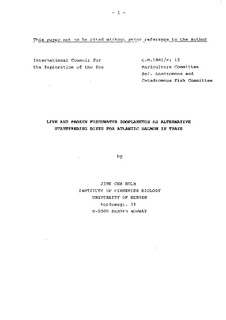| dc.contributor.author | Holm, Jens Christian | |
| dc.date.accessioned | 2012-07-03T09:02:36Z | |
| dc.date.available | 2012-07-03T09:02:36Z | |
| dc.date.issued | 1985 | |
| dc.identifier.citation | This report is not to be cited without prior reference to the author | no_NO |
| dc.identifier.uri | http://hdl.handle.net/11250/103935 | |
| dc.description.abstract | Six groups of Atlantic salmon (Salmo salar) fry were starfed
with frozen Daphnia longispina, standard start food type EWOS or
water with natural content of live zooplankton drained from the
littoral zone in a coastal lake. In last five days, those fed
live zooplankton were given additional food in the form of frozen
Daphnia. Dry-fed groups were the only ones to have an overall weight
gain but had the lowest activity. Fry fed live zooplankton
had the highest activity but the natural species composition
of the offer was not optimal for startfeeding. Survival was
highest in the group fed frozen Daphnia whose tank had bottom
drainage. High yolk absorption rates (implicate early termination of yolk
sac) found in live zooplankton groups may be favourable if a
net energy gain is achieved due to early feeding on a live prey. | no_NO |
| dc.language.iso | eng | no_NO |
| dc.publisher | ICES | no_NO |
| dc.relation.ispartofseries | ICES CM Documents;1985/F:15 | |
| dc.subject | feeding | no_NO |
| dc.subject | fôring | no_NO |
| dc.subject | fish feed production | no_NO |
| dc.subject | fish feed production | no_NO |
| dc.title | Live and frozen freshwater zooplankton as alternative startfeeding diets for Atlantic salmon in trays | no_NO |
| dc.type | Working paper | no_NO |
| dc.subject.nsi | VDP::Agriculture and fishery disciplines: 900::Fisheries science: 920::Resource biology: 921 | no_NO |
| dc.subject.nsi | VDP::Agriculture and fishery disciplines: 900::Fisheries science: 920::Fish health: 923 | no_NO |
| dc.source.pagenumber | 18 s. | no_NO |
